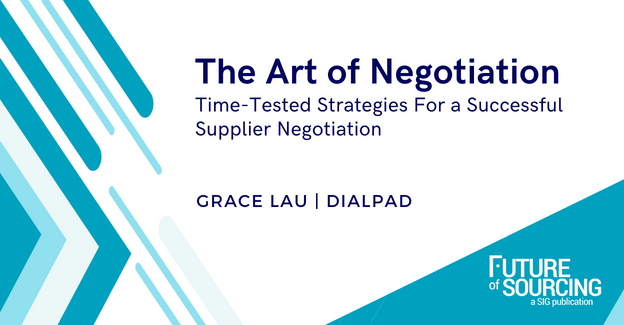Find it hard to negotiate? Grace Lau, Director of Growth Content at Dialpad, shares how to make a difference next time you’re in the hot seat by following these time tested tips for successful supplier negotiation.
Put simply, supplier negotiation is the process of coming to mutually acceptable terms between the procurer (buyer) and the vendor (seller).
As we can see from the chart below, the negotiation stands at the center of the procurement process, beginning by first planning business requirements, then clarifying this with the supplier, and finally, assessing performance and results.
During such discussions, common negotiation points tend to be about cost, contract length, payment terms, volume, and delivery or implementation. Then, think about all those involved: the logistics providers, manufacturers, distributors, and retailers, just to name a few.
Why negotiate procurement at all?
Procurement can make or break your company - will you receive a good price? How would it affect the promises you made to your customers? What are the risks involved?
By openly discussing this with suppliers, you improve communication, build relationships, save money, and improve performance and quality by obtaining that win-win arrangement.
How can you successfully navigate supplier negotiations?
Given the complex nature of supplier negotiations, making a comprehensive list for all types of businesses would be setting quite an impossible task. Instead, here the aim is to get you thinking, by introducing some time-tested techniques for successful supplier negotiations, which you can later apply to your own situation.
1) Preparation is key
Not knowing what to say, lacking confidence, and being nervous are typical barriers to successful negotiations. By preparing, you can help avoid these issues.
First, and this sounds easy, but know what you want. Begin by asking yourself questions such as: How far are you willing to go? What is your reserve point? What compromises can you make? Are there financial constraints or customer feedback to adhere to?
Second, understand what the vendor wants. This will allow you to see how your own defined goals fit in and work on any areas of mutual gain, which will only enhance any deal struck. Once you have set these boundaries, you will already walk into any negotiation more prepared.
Perhaps you are not going alone, but walking in with a team of negotiators. Picking the right team for the job, and ensuring they have the right procurement training, will ensure you get a great deal as you collectively persuade the vendor. If this is the case, it is crucial to consider: who in your team knows how they work and talk? Who might be best to prepare the preparation work? We don’t want to see any chalk and cheese in the negotiation room.
2) Know who you’re negotiating with
This is a continuation of your preparation: if you know your client and understand both parties’ needs, you can negotiate the best deal.
For instance, when dealing with repeat vendors, opting for a deal acceptable to both sides will result in mutual satisfaction whilst also fostering long-term relationships. Whereas for a supplier you don’t intend to use again, you can afford to be more ruthless and make fewer compromises.
Considerations, such as these, are part of what is called supplier relationship management (SRM). As shown in the graph below, there are multiple positive impacts of SRM. Topping the list is the improvement of reliability and reducing risk, but others include increasing value and accelerating timelines.
3) Be critical and crunch the numbers
When you get in the negotiating room, be sure of your numbers and theirs - check out their blockchain to be sure. This way, you can be sure of accuracy, and maintain any goals you set.
This doesn’t just mean your own figures, but also gathering competitive intelligence and exploring market trends. This can mean a few things, from comparing quotes from multiple sources to critically analyzing future trends and whether the supplier can adapt to them.
Although it's important to stay on budget, consider how obtaining a cheaper contract might inadvertently sacrifice other elements. For example, the customer experience will suffer if your cheap supplier lacks effective management strategies for call centers.
4) Being transparent
Transparency in a supply chain has become a cornerstone of modern marketing and business strategy. Research has suggested that 94% of customers stay loyal to a transparent brand and are more likely to spend more.
Ensuring that transparency can begin at the negotiating table with your intended suppliers. By being truthful and building trust with a supplier, you will be able to build rapport and ensure that there is continued clarity.
This consistent awareness of knowing what is happening at each stage of the supply chain means that you can pass the same assurances to your customers. Ultimately, building brand loyalty and trust.
5) Know your industry and theirs
If you want to be convincing during the negotiation stage, and get the best deal for you, research the necessary jargon of the industry and the vendor.
This is more than understanding what the prices should be. If you know the ins and outs of their business, you will avoid any scams, and you won’t make unnecessary compromises, which could later affect your transparency and customer satisfaction.
For example, say you’re looking for someone to supply your outbound call centers. Even if this isn’t your core business, it’s important to research the industry and approach your negotiation from a knowledgeable position.
6) Being open to negotiating
Now, you don’t want any gunboat diplomacy - it is better to be smarter and savvier than that, and evidence shows that collaborative approaches work better and improve supplier relationships.
Being open means more than just collaborating. It also means considering questions such as: Whether you need a long-term contract? If so, are there any renewal charges which might affect the deal? What kind of scale or volume are you looking for, and could this be negotiated to obtain a better deal? It means considering all the elements.
One thing you must avoid is over-negotiation, which results from a lack of preparation or the lack of a clear goal. This can lead to an unsatisfactory outcome for both parties.
In order to make the vendor feel well treated, acknowledge their side and don’t focus only on the price as this may make them feel uncomfortable - consider the other services they might offer, like weekend deliveries, customized work, and extra customer service.
7) Have a backup plan
If all else fails, it is best to know that you have other alternatives. A backup plan becomes pivotal to making sure you don’t just accept a bad deal and can negotiate with confidence.
Your backup or BATNA (best alternative to a negotiated agreement) is imperative to avoid making any rash decisions.
If what you’re negotiating is necessary to the day-to-day running of your business, you can’t afford to be left without a supplier deal. Therefore, while you might be talking to multiple vendors, it is important not to confirm any rejections until you have a signed contract with one.
8) What’s next? Execute and assess your negotiation.
Once an agreement has been reached and the contract is being carried out, it is time to assess the results. By referring back to your aims and comparing the results you can also use your negotiation process as a way of learning and improving. This can create a way of working together with your supplier to ensure your good relations continue or highlight the need to change.
Final Thoughts
In fast-paced and ever-changing markets, it's important to always be ready to react to new trends. Successful supplier negotiations play an integral role in your innovation. Take the initiative and, above all, be confident in yourself and what you want, to ensure your collaborative future success.









